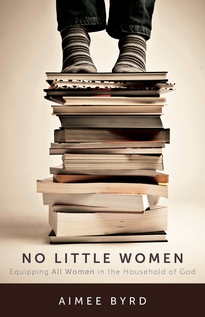Aimee Byrd says bad theology is entering doctrinally sound churches via women’s ministries. Others agree.
If true, this is an incredibly serious matter, since theology is the study of who God is. No Little Women discusses the problem and suggests the solution, Equipping All Women in the Household of God.
This book is written primarily for women, elders, and pastors, with many sections and discussion questions addressed separately to these groups. This unique approach is necessary because women need to know what is said to the church leadership, and the office bearers need to know what is being said to women.
In a world littered with conflict and disagreement about the role of women, Byrd actively attempts to avoid such discussions, focusing rather on a few indisputable points:
- Women have influence in their families, in the church, and wherever else they are.
- Women were created to be necessary allies of their husbands.
- Women need to know the Word of God and be transformed by it, arriving at the truth, not merely searching for it.
- False teachers want to make disciples in the church, but we are forbidden to welcome them into our homes.
Although Christian women are a valuable commodity to the publishing and speaking industries, they need the same theological standards as men. Yes, there are many gifted women with popular women’s ministries, but some of them attack or denigrate the basics of Christianity: the authority of the Bible, the Trinity, Jesus’ incarnation, justification by faith. Because these teachers can be appealing, compassionate, understanding, and relevant, we sometimes need to be reminded to notice deviations from the truth. Byrd gives an array of ideas to watch out for. She also urges pastors and elders to read some of the titles being studied by the women in their church.
Byrd identifies three problems commonly encountered in Christian best sellers for women
- Ecumenicalism at the expense of doctrine
- Claiming direct revelations from God
- Reading one’s own meanings into the text
The author is careful not to attack any author or teacher, which is wise. Instead, she gives excerpts from various popular books for the reader to practice finding problem issues. I have read some of the authors she discusses and, while it is possible to criticize them, it is also possible to learn from them if one is careful, as Byrd also says.
At one point the character of the book changed, or perhaps my perception of it did. In any case, suddenly the author and I were joyfully engaged in a discussion of how to read carefully (using How to Read a Book, link to my review) and how and why to review what we read.
No Little Women ends with a chapter written to pastors about how to preach to women as well as men. That chapter concludes with an excellent encouragement to women about how and why to listen to sermons, a section that applies to all.
In No Little Women, Aimee Byrd does the church a great service by discussing a problem that is so explosive most people avoid it. She offers solutions that seem obvious to some but perhaps not to others, the most important being that the preaching should be based on the Word of God, listened to diligently, and addressed to the entire congregation.
There is an interesting omission in this book. In the Bible women are instructed to ask their husbands about things they do not understand. Byrd emphasizes going to the elders or the pastor instead. Now, it is true that some husbands are not Christians, but many are. It is also true that if the husband is away or busy, for whatever reason, he will have no time to consider his wife’s questions, and this is a serious matter. The important point, though, is that by God’s design husbands are the heads of their families and no one should try to bypass or undermine them. Looking at things this way, the words Byrd wrote to church leaders should also be read by husbands.
In conclusion, many of the things Aimee Byrd says are true. Some of them may seem a bit off although it is hard to pin that down, but the important thing is this: she bravely and carefully opens a conversation that has long been needed. All Christians who value the truth about God, i.e. true theology, should read this book and it should be in every church library.
Disclosure: I received a free copy of this book from P&R publishing in exchange for an honest review.


Super tricky stuff. My mother used to say that the devil makes his way into the church through the ladies league. I always thought it was such an archaic thing to say, but I am pretty sure she meant it in terms of 2 Tim 3:6-7 Not easy to articulate in a feminist culture, though. Looking forward to reading this! Hoping it is at the OPL.